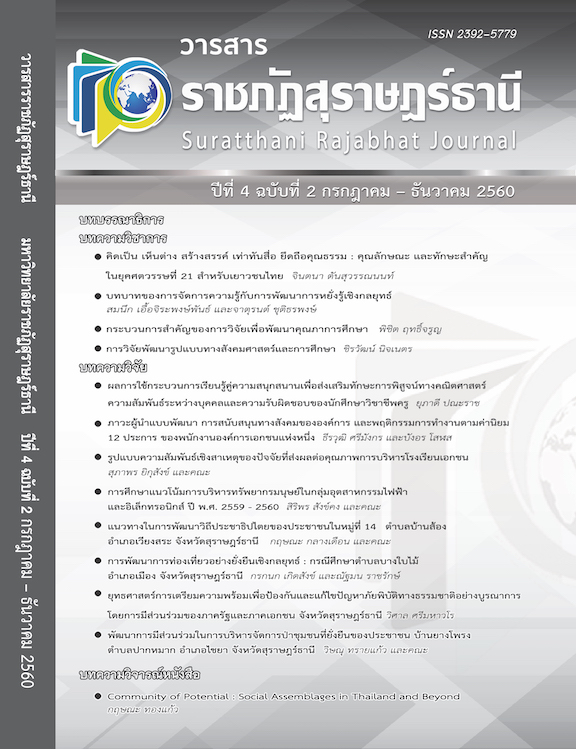The Role of Knowledge Management in Developing Strategic Intuition
Main Article Content
Abstract
This article aims to present the Strategic Intuition concept for 21stcentury leaders, who seek different management tools and concepts to drive organizational success. Due to the advancement of technology, people have access to knowledge. Have unlimited time and place. This results in a boundless world. The development of strategic intuition of leaders through knowledge management concepts can be achieved through a process driven through knowledge-based perspectives, which are two key components: Expertise Capability and Learning Capability to advance into the process of developing strategic intuition. Improving the strategic intuition of the leaders can be achieved by four main steps: 1) Study the success pattern of what has happened in the past. 2) Create a mental focus. 3) Connect past and present ideas. 4) Practice with a stable mind.
Article Details
References
เกรียงศักดิ์ เจริญวงศ์ศักดิ์. (2549). การคิดเชิงกลยุทธ์. กรุงเทพฯ : ซัคเซสมีเดีย.
ไพฑูรย์ สินลารัตน์. (2557). ทักษะแห่งศตวรรษที่ 21 : ต้องก้าวให้พ้นกับดักของตะวันตก. กรุงเทพฯ : โรงพิมพ์แห่งจุฬาลงกรณ์มหาวิทยาลัย.
ประพนธ์ ผาสุขยืด. (2549). Intuition ปัญญาญาณ. (พิมพ์ครั้งที่6). กรุงเทพฯ : ใยไหม.
สุดใจ วันอุดมเดชาชัย. (2556). การจัดการเชิงกลยุทธ์. กรุงเทพฯ : สามลดา.
วิจารณ์ พานิช. (2548). การจัดการความรู้ : ฉบับนักปฏิบัติ. กรุงเทพฯ : สำนักพิมพ์สุขภาพใจ.
สมนึก เอื้อจิระพงษ์พันธ์และคณะ. (2556). การจัดการความรู้เพื่อสร้างสรรค์นวัตกรรมของบุคลากรสายปฏิบัติการวิชาชีพของมหาวิทยาลัยในกำกับของรัฐ. วารสารพัฒนบริหารศาสตร์. 53(1), 1-30.
Alavi, M. & Leidner, D.E. (2001). Review: Knowledge Management and Knowledge Management Systems: Conceptual Foundations and Research Issues. MIS Quarterly 25(1), 107-136.
Brown, S.L. & Eisenhardt, K.M. (1997). The Art of Continuous Change: Linking Complexity Theory and Time-based Evolution in Relentlessly Shifting Organizations. Administrative Science Quarterly, 42(1), 1-34.
Canton, J. (2006). The Extreme Future: The top trends that will reshape the world in the next 20 years. New York : Pengiun group.
Chang, S.C. & Lee, M.S. (2007). The Effects of Organizational Culture and Knowledge Management Mechanisms on Organizational Innovation: An Empirical Study in Taiwan. The Business Review, Cambridge, 7(1), 295-301.
Coughlin, D. (2005). Corporate Catalysts: How To Make Your Company More Successful, Whatever Your Title, Income, or Authority. New York : Book-Mark Press.
Coulter, M. (2008). Strategic Management in Action. (4th ed.). New Jersey : Pearson Education.
Dane, E., Pratt, M.G. (2007). Exploring Intuition and Its Role in Managerial Decision-making. Academy of Management Review 32, 33-54.
Dimmock, C., & Walker, A. (2000). Globalisation and Societal Culture: Redefining Schooling and School Leadership in the Twenty-first Century. A Journal of Comparative and International Education. 30(3), 303-312.
Duggan, W. (2013). Strategic Intuition: The Creative Spark in Human Achievement. (2nd ed.). New York : Columbia Business School.
Freedman, L. (2013). Strategy: A History. New York : Oxford University.
Grant, R.M. (2003). Strategic Planning in a Turbulent Environment: Evidence from the Oil Majors. Strategic Management Journal, 24(6), 491-517.
Hamel, G. (1996). Strategy as Revolution. Harvard Business Review, 74(4), 69-82.
Hebron, L. & J. F. S. Jr. (2017). Globalization: Debunking the Myths. London : Rowman & Littlefield.
Hitt, M. A., Hoskisson, R. E., & Ireland, R. D. (2007). Management of Strategy: Concepts and Cases. Ohio : Thomson South-Western.
Jone, N.B., Herschel, R.T. & Moesel, D.D. (2003). Using Knowledge Champions to Facilitate Knowledge Management. Journal of Knowledge Management 7(1), 49-63.
Jung, C. G., (1971). Psychological Types. NewJersey : Princeton University Press.
Khatri, N., Ng, H.A., (2000). TheRole of Intuition in Strategic Decision-making. Human Relations 53, 57-86.
Kouzes, J. M., & Posner, B. Z. (2012). The Leadership Challenge: How to Make Extraordinary Things Happen in Organizations. (5th ed.). San Francisco : Jossey-Bass.
Krames, J. A. (2005). Jack Welch and The 4 E's of Leadership: How to Put GE's Leadership Formula to Work in Your Organizaion. New York : McGraw-Hill.
Liao, S.H. (2003). Knowledge Management Technologies and Applications-Literature Review from 1995-2002. Expert Systems with Applications. 25, 155-164.
Liao, S.H. (2008). Relationships between Knowledge Inertia, Organizational Learning and Organizational Innovation. Technovation. 28, 183-195.
Meers, K.A. & Robertson, C. (2007). Strategic Planning Practices in Profitable Small Firms in the United States. The Business Review Cambridge. 7(1), 302-307.
Miller, C.C. & Cardinal, L.B. (1994). Strategic Planning and Firm Performance: A Synthesis of more than Two Decades of Research. Academy of Management Journal. 37(6), 1649-1665.
Miller, C.C., & Reland, R.D., (2005). Intuition in Strategic Decision-making, Friend or Foe in the Fast-Paced 21st
Century. Academy of Management Executive 19, 19-30.
Mintzberg, H. (1994). The Rise and Fall of Strategic Planning. New York : Free Press.
Mintzberg, H. (1989). Mintzberg on management: inside our strange world of organizations. New York : Free Press.
Nonaka, I. & Takeuchi, H. (2000). Classic Work: Theory of Organizational Knowledge Creation. Knowledge Management: Classic and Contemporary Works. London: The MIT Press.
Perreault, G., & Zellner, L. (2012). Social Justice, Competition and Quality: 21st Century Leadership Challenges. United States of America : The National Council of Professors of Educational Administration.
Petrash, G. (2001). Strategy: Compelling Word, Complex Concept. Knowledge Management: Classic and Contemporary Works. London : The MIT Press.
Porter, M. E. (1996). What is Strategy?. Harvard Business Review.
Rothaermel, F. T. (2013) Strategic Management: Concepts and Cases. New York : McGraw-Hill.
Schmidt, E. & J. Cohen (2014). The New Digital Age: Transforming Nation, Businesses, and Our Lives. New York : Vintage Book.
Thompson, A. A., Jr., Strickland III, A.J., & Gamble, J. E. (2007). Crafting & Executing Strategy: The Quest for Competitive Advantage: Concepts and Cases. (15th ed.) New York : McGraw-Hill.
Venkatraman, N. & Ramanujam, V. (1986). Measurement of Business Performance in Strategy Research: A Comparison of Approaches. Academy of Management Review, 11(4), 801-814.
Williams, K., & Kinicki, A. (2012). Management: A Practical Introduction. (6th ed.). New York : McGraw-Hill.
Wikipedia. (2017). Intuition. Retrieved March 7 2017. from https://en.wikipedia.org/wiki/Intuition.


